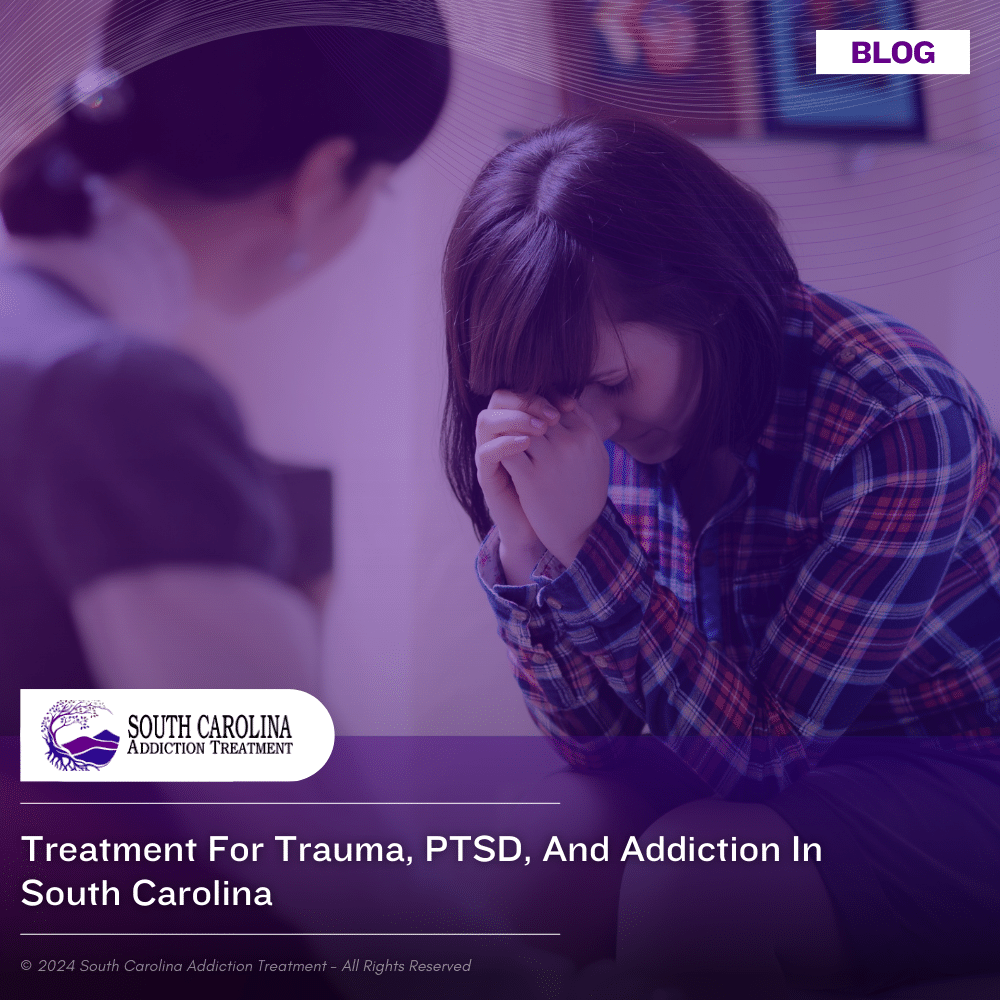Treatment for Trauma, PTSD, and Addiction in South Carolina

Medically Verified: 2/1/24
Medical Reviewer
Chief Editor

All of the information on this page has been reviewed and verified by a certified addiction professional.
When a person experiences a traumatic event, the inability to process and cope with that event can lead to the development of post-traumatic stress disorder (PTSD), a type of anxiety disorder characterized by flashbacks, agitation, depression, and anxiety. PTSD can be terribly difficult to cope with, so many people with PTSD turn to drugs or alcohol to soothe their symptoms. This act of self-medication can only provide temporary symptom relief, and it often leads to the development of an addiction.
Nearly 50% of people seeking treatment for addiction have PTSD, which is a rate 5 times greater than the national average. Further, the prognosis for people with co-occurring PTSD and substance use disorder is poorer than those with only one of the two conditions.[1] These numbers highlight the necessity of high-quality dual diagnosis treatment for trauma, PTSD, and addiction.
South Carolina Addiction Treatment offers an integrative dual diagnosis treatment model that can provide individualized treatment for trauma, PTSD, and addiction. While there is no one-size-fits-all treatment regimen, individually-tailored care can address the unique needs of each patient so they are prepared for a life in sobriety.
The Effects of PTSD on Addiction and Recovery
PTSD can cause an array of troublesome symptoms, such as intrusive memories and vivid flashbacks, avoidance symptoms such as avoiding people, places, or things, and drastic changes in thinking, mood, and emotional reactions. These lingering effects can lead to fear, anxiety, depression, and stress, all of which increase the risk of substance abuse and addiction.
Leaving trauma and PTSD untreated can be dangerous because untreated PTSD can result in a drug or alcohol relapse. PTSD and substance use disorder have many overlapping symptoms though, making it practical to treat both conditions simultaneously.
Therapies for Trauma/PTSD and Addiction
Several therapies are highly effective in treating PTSD and substance use disorder. Some of the most widely used include:
Cognitive Behavioral Therapy (CBT)
CBT is a popular treatment technique that helps patients identify and modify unhealthy behaviors and thought processes. It can help people with PTSD cope with painful memories and thoughts in a healthy way.
Eye Movement and Desensitization Reprocessing (EMDR)
EMDR is a technique where patients follow their therapist’s hand movements, making bilateral eye movements. While making these eye movements, patients are asked to recall details of a traumatic event. After several sessions, the negative emotions surrounding the person’s trauma will be reduced, thereby increasing the patient’s ability to cope with their trauma.
Cognitive Processing Therapy (CPT)
CPT is a type of CBT that addresses self-defeating thoughts and beliefs that are related to one’s trauma. By modifying these beliefs, individuals can better process thoughts and feelings surrounding traumatic events. CPT is typically facilitated over 12 sessions to treat trauma and PTSD.
Prolonged Exposure Therapy (PET)
PET is another type of CBT that encourages patients to slowly and gradually approach trauma-related memories and feelings. Many people with PTSD try to avoid these memories, but facing them head-on in a safe, therapeutic environment can reduce the negative emotions tied to them.
Treatment Considerations for People With PTSD and Addiction
Throughout treatment, care is designed with the needs of PTSD patients in mind. Treatment should involve:
Trauma-Informed Care
Trauma-informed care is a therapeutic approach that promotes safety, empowerment, and patient healing. It aims to recognize and respond to the signs, symptoms, and effects of trauma in all therapy modalities to better tailor care toward the needs of the patient. No matter the treatment is applied at the time, clinicians take into consideration how trauma has affected the individual.
Safety and Comfort
In order for treatment to be effective, patients must feel safe and comfortable in treatment. Rehab centers providing treatment for co-occurring PTSD and addiction make safety and comfort a priority by using small groups, honoring patient privacy, and extending compassion to every aspect of care.
Treatment Medications
Some medications may be necessary during the treatment process. For example, antidepressants or anti-anxiety medications may be used to alleviate PTSD symptoms and improve the patient’s quality of life.
Holistic Healing
In addition to behavioral therapy and medications, holistic therapy can also be implemented to support patients in their recovery journey. Things like proper nutrition, regular sleep, and physical exercise can treat depression, anxiety, and symptoms of stress, thereby reducing PTSD symptoms. Other holistic therapies that may be used include animal-assisted therapy, yoga, meditation, breathwork, and adventure therapy.
Find Treatment for Trauma, PTSD, and Addiction in South Carolina
Overcoming PTSD and addiction can be extremely difficult–especially without professional help. At South Carolina Addiction Treatment, we are dedicated to providing each patient with an individually-tailored treatment plan that addresses their unique needs. Once you overcome PTSD and other root causes of your addiction, you can truly begin to heal and embrace a life in recovery.
Don’t wait any longer to get the help you deserve. Call now to speak with a qualified team member.
References:

